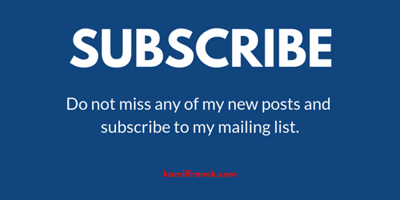How Facebook Makes Money: Business Model Explained
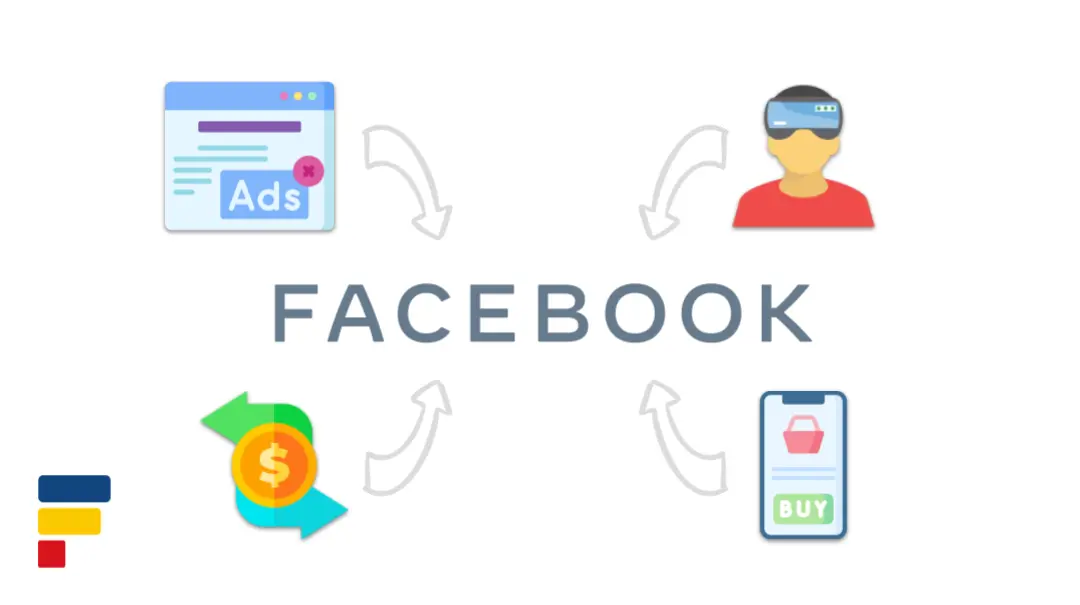
Facebook is not a monopoly, but with its more than 3 billion users worldwide across Facebook, Instagram and WhatsApp, it has a dominant market presence among social media and messaging tools. Facebook’s gigantic user penetration worldwide is what makes it such a valuable company. Still, when it comes to Facebook’s business model and how it makes money, users are not paying Facebook anything. At least not directly.
Facebook makes money predominantly by showing ads from advertisers within its Facebook and Instagram apps. Advertising represented 98% of Facebook’s $86bn revenue in 2020. The remaining 2% of revenue came mainly from selling Oculus and Portal devices and also payment fees from developers.
But why not let Mark Zuckerberg, Facebook CEO, explain Facebook’s business model himself in one simple sentence in the video below 😉.
The Facebook business model is based on offering its tools and services mostly for free to billions of users and then making money by allowing businesses to show Facebook’s users advertising. Advertisers pay the price to Facebook that is determined in an auction, based on demand and supply.
That means that people who use Facebook services (users) are not the ones paying Facebook for it. Real customers are primarily small businesses advertising on some of Facebook’s family of apps. Facebook’s focus on small businesses became an even more apparent part of the Facebook strategy as it introduced the first version of its e-commerce tools called Facebook Shops.
Facebook is not the first nor the last business with a similar business model. Still, Facebook is an excellent example that this business model is not without issues when the interests of users and customers (advertisers) are not in line.
Over the years, Mark Zuckerberg, Facebook founder, CEO, and controlling shareholder in one person, aggressively grew Facebook from a small project founded in his college dorm room into a social media giant.
However, the same aggressive approach that drove Facebook to the top, combined with inherent issues in its business model, also seems to be a reason why Facebook’s success is tainted by so many shameful privacy and security breaches.
Facebook’s past issues were not one-off accidents but a decade-long pattern of behavior where Facebook showed total disregard for people’s privacy and security. It all culminated in the famous Cambridge Analytica scandal and subsequent $5bn penalty from Federal Trade Commission in 2019.
Despite all its past and also current issues, Facebook’s business is performing exceptionally well. Its revenue was $86bn in 2020, growing by 22% despite the COVID-19 pandemic. Its profit margin was 38%, and net income was $29bn.
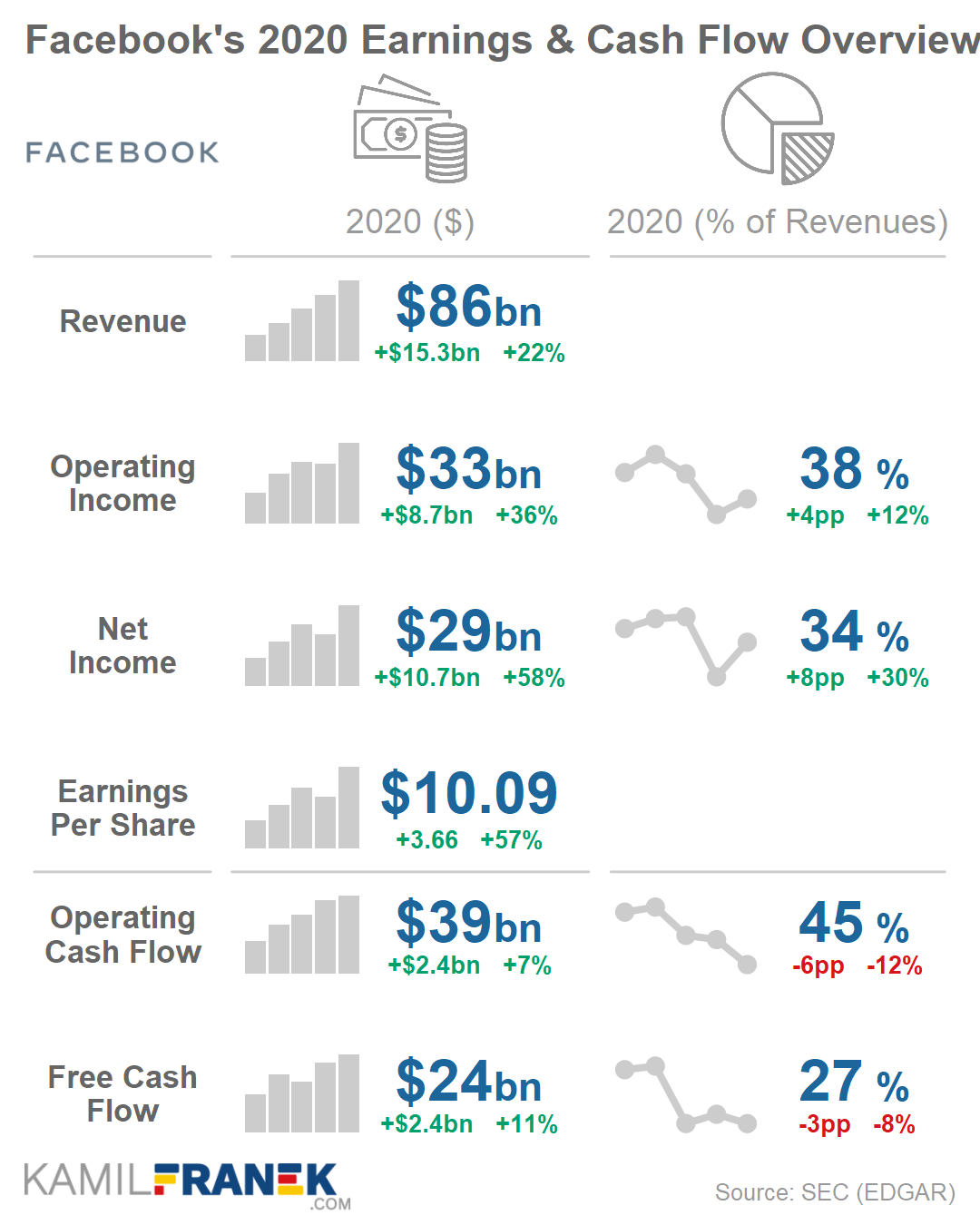
Facebook’s market share on ad revenue in the US in 2019 was 23%, making it the second-biggest player after Google (with a 32% market share). Compared to Google, Facebook experienced much higher growth in 2019. The total size of the US market was around $130bn annually.
Facebook business is very well focused around its vision of “building communities and connecting people together.” It does that mainly through its family of apps (Facebook, Messenger, Instagram, WhatsApp). Even Facebook’s hardware devices and more future-based VR/AR activities fit this vision very well.
Mark Zuckerberg also has a clear long-term vision for Facebook that goes well beyond what Facebook is doing right now. That includes social e-commerce and also artificial and augmented reality. He also has a track record of delivering things he says he will. Unfortunately, he also has a track record of messing things up along the way by disregarding user privacy and sometimes also saying one thing and doing another.
This article will explore different parts of Facebook’s business model and how it makes money. It will be focused not only on advertising and various factors that drive advertising revenue, but I will also touch on other revenue sources, even though they are currently tiny, compared to revenue from advertising.
I will also spend some time on Facebook’s different controversies, which go far beyond Facebook’s inherent privacy issues. Addressing these controversies is core for Facebook’s future. If not appropriately addressed, they can be a reason why Mark Zuckerberg’s grand vision for Facebook’s future might not materialize.
If you would like to see more number-based analysis of Facebook financials, you can go through my article “Facebook Financial Statements: Overview & Analysis”.
⚙️ How Does Facebook Make Money from Advertising
Facebook makes money by auctioning off space for ads within Facebook and Instagram users’ feeds and stories. Advertising represents 98% of Facebook revenue. The remaining 2% comes from other activities, primarily from selling Oculus and Portal hardware products.
On average, Facebook earned $32 from each of its users worldwide in 2020, earning $84bn in total advertising revenue and an additional $2bn from its non-advertising business.
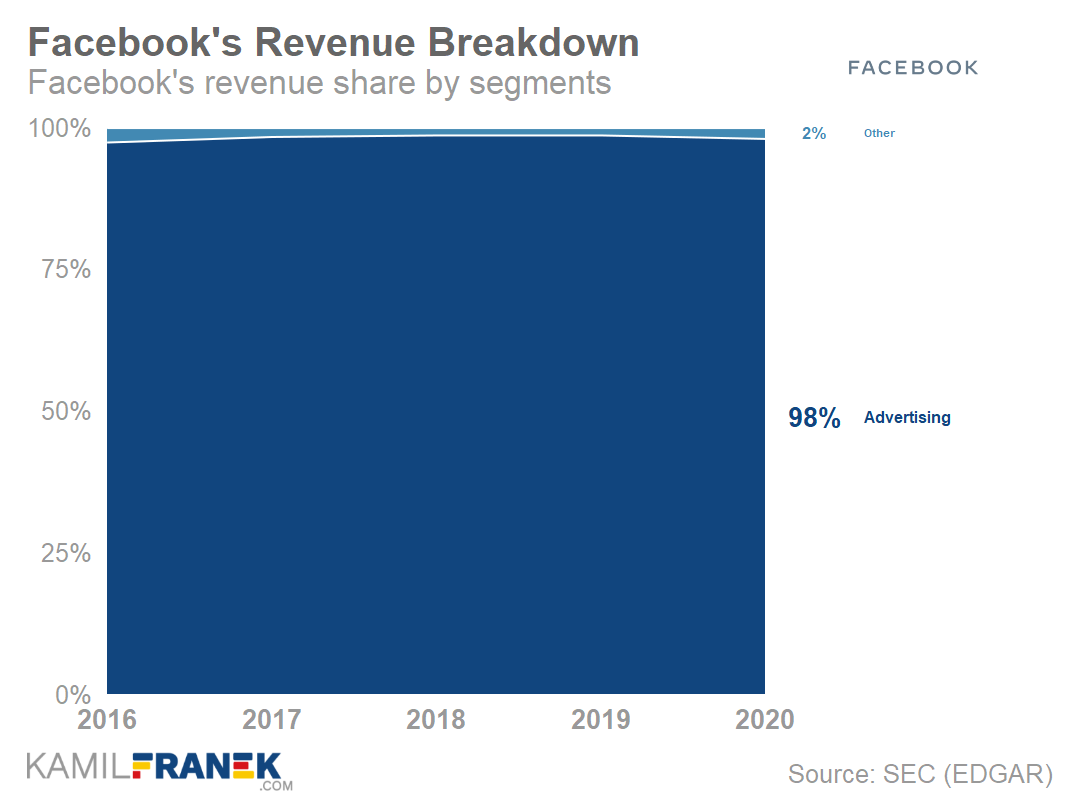
But it is not just standard, run-of-the-mill ads that Facebook shows to its users. Facebook knows a lot about us thanks to our behavior on Facebook’s family of apps that includes Facebook, Instagram, WhatsApp, and Facebook Messenger. These data and their value are the reason why it makes sense for Facebook to offer its products mostly for free.
For example, Facebook has data about whom we communicate with, what content we consume and react to, and even what pages and apps we visit outside Facebook apps. These are just a few examples, and there are many other data points Facebook collects.
Based on these, Facebook’s algorithms can estimate your personal profile and categorize you based on impressively granular characteristics that their algorithms can deduce. And they can do that even if you don’t specifically share it yourself, thanks to the predictive power of machine learning algorithms they use.
Facebook knows our age, religion, ethnicity, interests, political opinions, relationship status, and much more.
Of course, these predictions are not 100% accurate but are accurate enough to be very valuable for advertisers for precise ad targeting.
Facebook users are Facebook’s core revenue-making assets, and the value of Facebook’s business model is highly dependent on it. Users, however, are not Facebook’s primary customers; advertisers are.
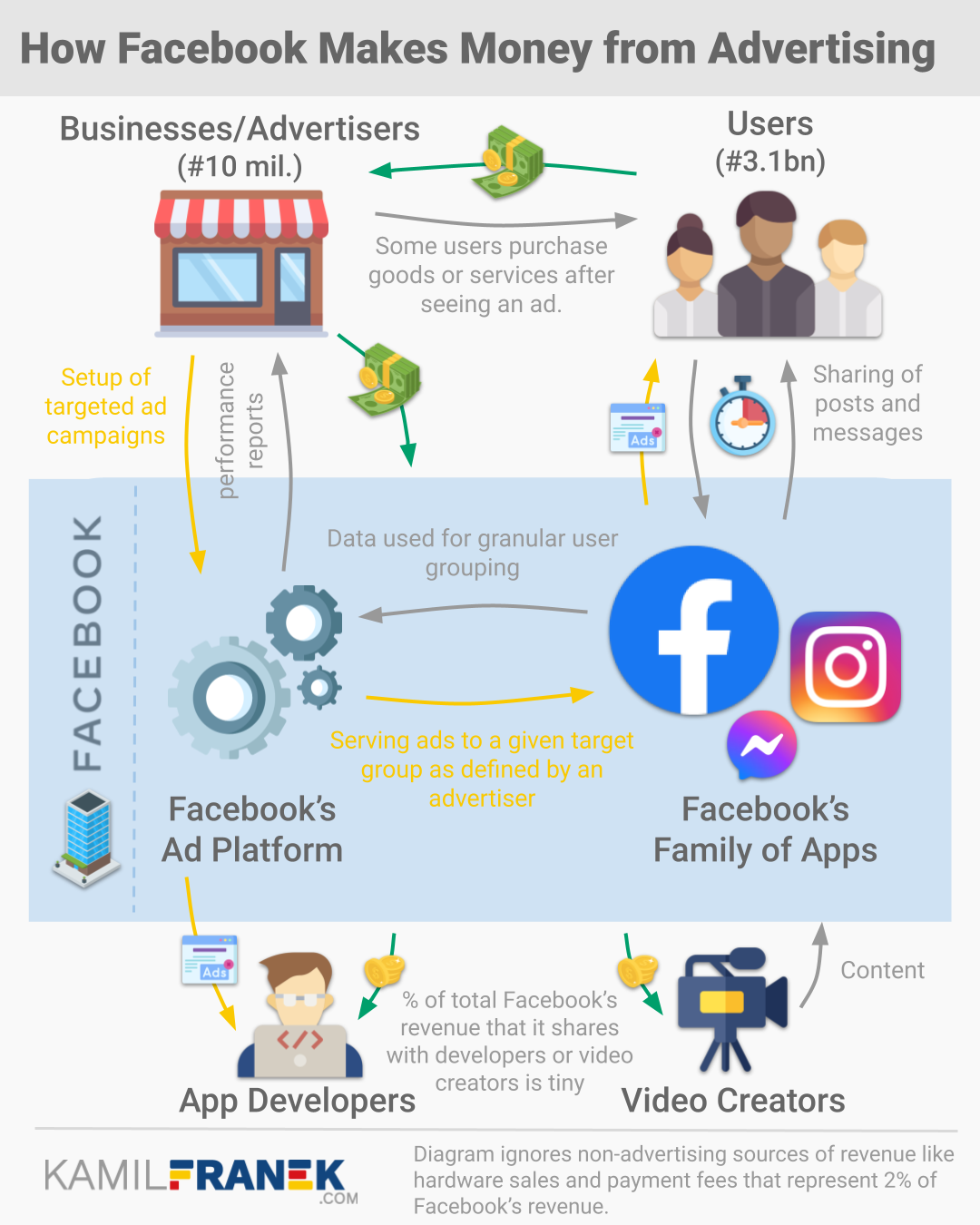
There are around 10 million advertisers that use Facebook’s ad platform, and they are primarily small businesses. Facebook Ad platform allows them not only to show the ads to targeted users, but it also offers detailed performance tracking on how different campaigns and different types of visuals work. Based on that, businesses can test what kind of campaign and for what type of users work best.
Similar to Google, Facebook’s biggest competitor for ad dollars, a price that businesses pay for ads on Facebook is determined by action where advertisers compete with each other. To win the auction, it is not only about price advertisers offer to Facebook when user clicks on their add.
It would not make much sense for Facebook to show ad campaigns that offered the highest price per click when people would not click on those ads very often. Therefore, an auction considers how often users will click on ads, and it is designed to prefer advertisements that will make the most money for Facebook.
Facebook shares a small part of its gross advertising revenue with partners like app developers that use its ad platform to monetize their apps or video creators that upload videos to Facebook Watch or, more recently, Instagram TV (IGTV). However, compared to the total revenue Facebook is generating, this is just a drop in the ocean.
Facebook shows ads across Facebook, Instagram, and also Messenger. There are currently no ads on WhatsApp, although Facebook was working on it for some time, in the end, decided not to do it.
In terms of advertising revenue, Messenger is just a tiny contributor, and most of the advertising revenue comes from Facebook and Instagram.
Facebook Feed is still the core revenue contributor with nearly 60% share on advertising revenue. Instagram revenue represents around 30% of advertising revenue. Although most of Instagram revenue comes from an Instagram Feed, Instagram Stories became quite a significant part of it, bringing in one-third of the revenue of Instagram.
The video above is a little bit dated in terms of presented numbers, but it is a good summary of how Facebook makes money and how it targets its ads.
🧑 Who are Facebook’s customers? Users vs Advertisers
Facebook’s over 3 billion users are what makes it such a valuable business. This market presence was helped a lot by the “network effects” that make it naturally harder for users to leave Facebook for another platform.
Still, to keep its business model working, Facebook has strong motivation to provide users a great experience and listen to what they want and need. But there is another group whose needs and wishes are critical to Facebook, and those are advertisers.
Facebook obviously cares a lot about both its users and its advertisers. But when we look back at situations where those groups’ interests went against each other, it is clear that advertisers are Facebook’s primary customers and their interests have a more significant weight in Facebook’s decision making.
They are the ones paying the bills, after all.
The fact that more users make Facebook more valuable is nothing surprising. It is true for most businesses, especially the ones monetized by ads. What makes Facebook users much more valuable for advertisers are the granular user profiles that Facebook creates about us.
Advertisers can target their ads based on these profiles to specific audiences and vary the message based on what works best for a particular group of users. What is more, they can very quickly see if the ad campaign worked and made money or not.
Advertisers are Facebook’s primary customers, but Facebook’s relationship with them, mainly the bigger ones, is not a love story. They quarreled a lot in the past about Facebook’s flawed ad performance tracking, and most recent issues were around advertisers pushing Facebook to do more about hateful content on Facebook.
This content is not illegal, but advertisers don’t want to be associated with it.
Facebook’s advantage in these confrontations with advertisers is that it is not dependent on a few big companies. Its customer base is much more granular, consisting of a lot of smaller businesses.
When many household name companies announce that they will stop advertising on Facebook, as we could experience from time to time, it does not significantly affect Facebook’s revenue.
That being said, Facebook eventually does what any successful company has to do to stay successful, which is listening to its customers and making sure their needs are met. And in Facebook’s case, customers are advertisers.
At the end of the day, whatever Mark Zuckerberg and Facebook management say about wanting Facebook to have a reputation for privacy going forward, we need to realize that Facebook’s business is based on collecting as much data as possible without significantly alienating its users.
Apart from advertisers and users, another counterparty Facebook needs to consider when running its business are regulators and politicians. The issue is not only its antitrust lawsuit that is coming. It is also about defining the role Facebook, and other social media players should play in the moderation of speech on the internet and defining where is a line for content that should not be acceptable.
Facebook found itself in a very tricky position where there is general agreement that Facebook is doing things wrong. But different groups have pretty opposing views on if Facebook should allow more free speech or less.
Mark Zuckerberg gave a speech in 2019 in Georgetown, where he made good points about how important it is to protect free speech and committed to protecting it on Facebook as much as possible. He also took a lot of heat when he was protecting these views, particularly about his decision not to censor political ads.
More than one year after that speech, when we look at what Facebook actually did, we can see again that Facebook’s actions were far more pragmatic for its bottom line. It opted for less controversy, which is far better for business and advertisers, even though it was against the ideals, Mark shared during his Georgetown speech.
Facebook’s position is that there is no conflict of interest between users and advertisers, as you can read in Mark Zuckerberg’s post “Understanding Facebook’s Business Model.”
I beg to differ on this. Based on just looking at what Facebook does compare to what it says it wants to do when it comes to privacy, Facebook is on the advertisers’ side. They showed it on many occasions.
For example, recent full-page newspaper ads that attacked Apple changes that forced iOS apps to ask users consent before tracking them outside of the app clearly shows that when there is a conflict between what advertisers want and what users want, they chose advertisers. They even launched a separate campaign where Facebook promoted the benefits of targeted advertising.
That by itself does not make Facebook, an evil company. Many companies offer services for free and make money on the backend from advertising or other fees. Also, there are far more situations where users’ and advertisers’ interests are in line, like eliminating hateful content. But privacy is obviously not one of them, and we should be aware that if legally allowed, Facebook will most probably side with advertisers.
Facebook’s dedication to its around 10 million advertisers is even more striking and intriguing when we consider that Apple and Google’s decision to make it harder to track people on the internet outside of one app or service can actually solidify Facebook’s position in targeted advertising in the long run.
💵 Facebook Revenue Drivers (Revenue Formula)
Core drivers of Facebook advertising revenue are how many people use Facebook, how much time these users spend on Facebook, how many ads Facebook shows to its users per certain time, and finally, how much Facebook charges for one ad placement.
To make it more apparent how those revenue drivers work together, we can put them all into revenue “formula,” as you can see below.
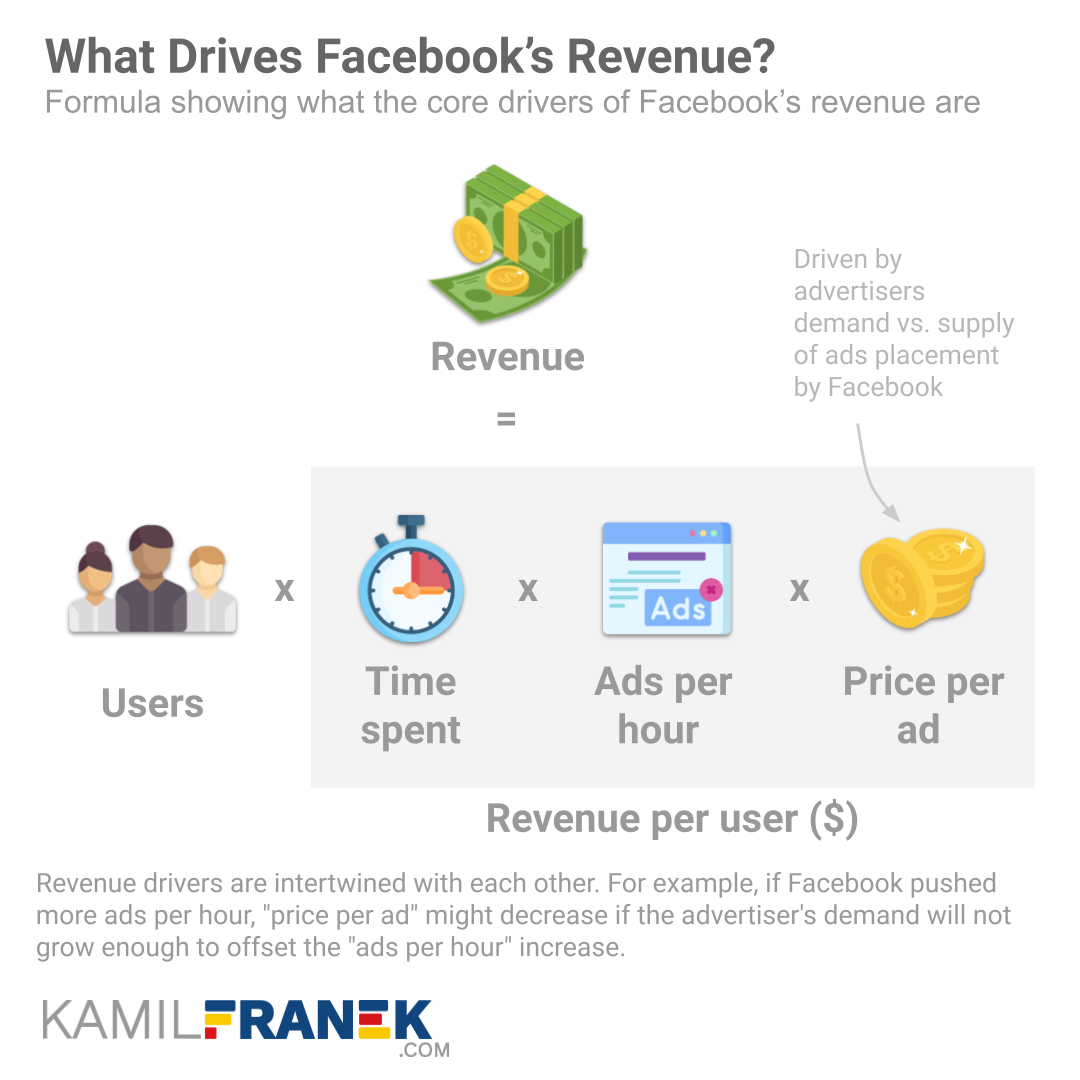
This revenue formula above tries to identify Facebook’s core revenue drivers and how they are connected. It is obviously a simplification. Reality is much more complex, and many drivers are also mutually connected and influence each other.
That being said, I like it as a way to summarize what Facebook business is actually about and as a guide when I consider how different actions by Facebook and related events might impact its revenue.
If any part of the formula is growing, it usually means that revenue is going up and vice versa, but we need to carefully consider if some changes do not influence another driver in the opposite direction.
Let’s consider each of the revenue drivers separately.
Users
![]()
The more users Facebook has, the more revenue it will earn. But this statement is true only if users increase across all geographies, segments, and products.
If users grow more in Asia than in North America, which is happening right now, then the result will be much slower revenue growth than user growth. The reason behind that is simply that Facebook’s average revenue per user in Asia is just a fraction of the average revenue per user in the US.
Facebook users can also grow thanks to acquisitions, as it happened with Instagram and WhatsApp.
When we consider WhatsApp and Instagram acquisition’s impacts through our revenue formula, both acquisitions increase the number of users. Both apps also contributed to more time spend on Facebook services.
WhatsApp, however, currently does not show any ads to its users, which means no advertising revenue. Instagram does show ads and is a significant revenue generator for Facebook.
From a short-term perspective adding ads to WhatsApp would mean more revenue, but Facebook needs to consider also how this decision would affect user attrition. Facebook’s initial idea to launch ads on WhatsApp was scrapped. The company now plans to monetize WhatsApp by charging businesses that use WhatsApp as a communication channel with its customers.
Time spend
![]()
More time people spend on Facebook using its different apps generally means Facebook can earn more revenue as it can show more ads to people.
For example, during the COVID-19 pandemic, people used social media more, which generally means higher revenue. However, in this case, pandemic also depressed prices of ads so that it more than offset the positive effect for more time spend on Facebook. Revenue growth thus slowed down compared to previous periods.
Ads per hour
![]()
If we assume that other revenue formula factors will stay unchanged, then more ads are showed per hour on Facebook, more revenue Facebook earns. This is much more tricky in reality because a more extensive supply of spots for ads can drive the price per ad down.
Recently, the number of ads was the lever Facebook was using to drive revenue up. Pushing more ads in 2019 and 2020 also meant that the average price per ad was slightly decreasing, partially offsetting the revenue growth thanks to serving more ads.
In 2018 and earlier, much more revenue growth came from a price increase and less from an increase in the number of ads.
The question here is where the level of ads per hour will start deterring users from using the app and how close to this level Facebook currently is, especially in the US market.
Price per ad
![]()
The last driver of Facebook revenue is the price per ad that advertisers pay to Facebook. Facebook uses its auction system to price ads, and price per ad depends and changes based on the supply of ads and demand from advertisers. The price might be the most volatile part of the revenue formula, easily influenced but changes in other drivers.
For example, If companies start to move a more significant part of their budget to Facebook ads, this will drive the price up and increase Facebook revenue.
Facebook can influence the price per ad by changing the number of ads (supply) to maximize revenue.
Facebook can also drive the price per ad up by making them more valuable for businesses. That is, for example, the reasoning behind Facebook’s recent introduction of e-commerce functionality into its apps allowing businesses to set up shops within Facebook, Instagram, or WhatsApp.
The idea is that it will be a more seamless user experience, leading to more people who click on a particular ad ending up purchasing the product. That will drive prices per ad up and increase Facebook revenue.
💬 How Facebook makes money from WhatsApp
![]()
One of the core Facebook apps is WhatsApp, with around 2 billion users worldwide. It is the most popular messaging app globally, even though it lags behind Facebook Messenger in the US.
Facebook purchased WhatsApp in 2014 for $19bn but did not make much money from it yet.
Initially, Facebook planned to make money from advertising on WhatsApp, similar to what Facebook did in Facebook Messenger. But Facebook scrapped these plans. Currently, Facebook says that it will pursue a different business model for WhatsApp.
Based on Facebook’s current plans, WhatsApp won’t be making money from advertising, but Facebook will earn money by providing tools for businesses to communicate with customers through WhatsApp. The same will be valid also for Facebook Messenger.
Facebook already collects some revenue from fees it charges business customers for using its WhatsApp API interface for sending messages to their customers. Customers can use it to send messages for free within 24 hours from the time customer contacted them, but after that period expires, WhatsApp charges businesses between 0.5 and 1 cent per message.
These paid messages have to be automatically generated based on templates that have to go through Facebook’s approval to avoid misuses.
Revenue from these fees is currently tiny, but Facebook’s plan is to build on top of this and offer a more comprehensive solution for businesses to communicate with their customers. We can’t expect that revenue from this will be close to what Facebook makes from advertising. Still, it is a reasonable business model focused on Facebook’s core customers, small businesses.
So far, Facebook was offering its small business customers highly targeted advertising. It also provides tools for customer service management through its messaging apps. On top of that, a simple e-commerce solution will be available in all of Facebook’s apps, including WhatsApp. This focus on small businesses is a crucial part of Facebook’s business model.
🥽 How Facebook makes money from Hardware (Bet on Virtual and Augmented Reality)
![]()
Facebook makes only around 2% of revenue from its non-advertising business. One of the main parts of it is revenue from selling hardware. However, Facebook probably does not make any profit from it, and the question is if it will ever do. But it fits Facebook’s strategy in other ways.
Portal
Let’s first look at the smaller part of the Facebook hardware business, which is Portal devices. In 2019 Facebook sold around 1 million Portal devices whoose main focus is to serve as a dedicated communicator. It supports connecting with others through Facebook’s apps but also through other popular video-conferencing apps. Portal also includes Amazon’s Alexa voice assistant.
It fits the Facebook strategy of connecting people together, but I would not expect this to become anything significant going forward.
Oculus and Facebook Glasses (VR&AR)
Oculus is a virtual reality headset that Facebook acquired in 2014. In 2020 Facebook introduced Oculus Quest 2, an upgrade to its previous model. It is currently mainly focused on gaming, but Facebook’s ambition goes far beyond gaming devices.
Market with these devices is still tiny, but Facebook is significantly gaining market share, and based on early numbers from 2020, its market share is 39%. It puts Facebook ahead of Sony, its main competitor in this area and leader in 2019.
In terms of revenue, Oculus probably brings the majority from 2% of non-advertising revenue Facebook earns. It is not a small number, but Facebook is probably not making any money from this and might never do, at least not directly.
Facebook is not trying to build a hardware business here. Its ambition is to create a whole new ecosystem of devices and software that will be AR/VR focused. Currently, it focuses mainly on gaming and fun stuff, but given that Facebook’s motto of connecting people together, gaming is just a start.
It looks like a big opportunity. The question is how Facebook will make money from it and what will be its business model.
I don’t think that Facebook will try to make it a premium hardware business similar to what Apple did with iPhone. Facebook will probably keep selling hardware at a cost level to make it interesting for a maximum number of people and focus on making money in other ways.
One option is charging software developers some percentage cut from their sales on the platform. This business model is already in place, even though the number of developers making apps and games for Oculus is still small.
Given how quickly users of Oculus are growing, it might become significant enough to attract more gaming developers to make Oculus another gaming platform next to Xbox, PlayStation, and Nintendo.
But we are just at the beginning, and there will be other ways how Facebook could make money from its AR/VR ecosystem, including advertising or subscriptions.
Recently Facebook announced that they would introduce AR glasses in cooperation with Ray-Ban. Hence, it looks that they are serious about this and are trying to make sure they dominate AR/VR space going forward before it becomes a thing.
❔ Other Ways How Facebook Makes Money You Might Not Know About
Apart from advertising, hardware sales, and WhatsApp API fees that I mentioned, there are also other ways how Facebook currently makes money. The revenue from these is super tiny, but it makes sense to be at least aware of them:
- One such revenue source consists of developers that use Facebook’s payment services.
- Facebook rents out unused capacity in its fiber network that connects its data centers worldwide.
- Facebook charges a subscription fee for its Workplace tool, which can be best described as a private Facebook that companies use for internal communication.
😠 Facebook’s Controversies That Need to be Addressed
There is a saying that unless you have a group of people who hate you, you are not really successful. By this measure, Facebook is one of the most successful companies in the world.
The Number of people who “shame” Facebook online or offline in everyday conversations is mind gobbling. Unsurprisingly, the recent WSJ rating of US companies showed Facebook as the worst one in customer satisfaction among the top 100 in their ranking.
“My goal was never really to make Facebook cool. I am not a cool person.”
— Mark Zuckerberg, CEO of Facebook, Public Q&A in 2014
The quote above is by Mark Zuckerberg from 2014, and at that time, Facebook’s CEO had probably no idea how forward seeing his comment will look after just a few years.
Nowadays, people blame Facebook nearly for everything that happens worldwide, and not all of it is well deserved. But even when we focus just on Facebook’s past privacy breaches, this toxicity around Facebook is understandable and well deserved.
“That which does not kill us, makes us stronger.”
— Friedrich Nietzsche
Facebook privacy scandals are shameful, but life goes on, and there is no reason why Facebook should not come back from this low level stronger and take it as a learning experience.
Mark Zuckerberg publicly admits Facebook is not the best poster boy for privacy initiatives right now, but that they want to become strong in it.
“So it’s going to take time, but over the next decade, I want us to build a reputation for privacy that’s as strong as our reputation around building good, stable services.”
— Mark Zuckerberg, CEO of Facebook, Earnings Call 2019 Q4
He should get a chance to do that, but given Facebook’s history and the fact that its business value is directly dependent on how much information they collect about its users, it would be crazy to just take Mark’s word for it.
Facebook will need to consistently work on this for years before people can take their privacy commitments seriously. And I agree that this might take a decade, even if Facebook focuses on it.
However, I am pretty skeptical that we will ever see Facebook as a privacy leader. It is simply incompatible with their current business model that motivates them to collect as much data about people as possible.
When you look at what Facebook is doing in practice, it is clear that this commitment to a strong reputation for privacy is just a talk without substance.
Mark Zuckerberg is a smart guy, and he has to be well aware that Facebook cannot afford another security blowup like Cambridge Analytica or Russian election interference without dare consequences from regulators, its users, and advertisers. But these were security issues and breaches of their previous FTC settlement orders.
In the security area, I am confident that Facebook will make it work, but let’s not kid ourselves that Facebook will be a privacy leader, at least in the definition of being a company that proactively protects people’s privacy. That is very probably not going to happen.
Their approach will be to meet all the requirements there, but they will hardly push privacy further unless it benefits their business in some other way. Let’s remember that its core customers are advertisers who benefit from Facebook’s hoard of users’ data.
It is understandable, but Facebook probably should not confuse people with its privacy “leadership” talk.
For example, privacy reputation and leadership are not reconcilable with recent Facebook’s public attacks on Apple because of its plan to ensure users can choose whether or not they allow an app to track them. Facebook is not fighting for privacy here. It is openly fighting against it.
Again, this does not make Facebook evil. In this fight with Apple, Facebook is simply fighting for itself and its core customers. Facebook customers are not its users, but rather around 10 million, primarily small businesses that advertise on Facebook and Instagram.
There are many more controversies about Facebook outside of privacy and security. I won’t fully cover them in this article, but let at least summarize the main areas.
Facebooks controversies and issues that might impact it going forward:
- Security: Avoiding anything that resembles Facebook’s past security breaches or disregarding commitments to regulators should be the top priority for Facebook. The consequences of not doing so are so dare that I am confident that Facebook’s commitment to this is genuine.
- Privacy: Mark Zuckerberg claims that he wants Facebook to build a strong reputation for privacy over the next decade. This, in my view, is just an empty statement that is contrary both to Facebook’s business model and also Facebook’s recent actions. Facebook is openly pushing for less choice for users when it comes to privacy. The only other explanation is that Marks’s definition of “privacy” very much differs from what usually people understand by it.
-
Antitrust lawsuit: Facebook’s looming antitrust lawsuit is another defining moment for the company. It focuses on Facebook’s market power, especially its acquisitions of Instagram and WhatsApp, which helped solidify Facebook’s already dominant market position.
Based on Facebook’s internal emails, these acquisitions’ openly stated purpose was to eliminate possible competition before it becomes too big. It is questionable if this lawsuit will achieve something, but Facebook acquisitions will be heavily scrutinized going forward, and Facebook won’t be able to simply acquire future competitors.
-
Content moderation: Big part of “toxicity” around Facebook is the presence of hateful content and misinformation. Facebook is ramping up its effort in content moderation, making sure this content is taken down and that certain content is not actively promoted to people’s feeds. But let’s face it, this is an impossible task.
There is undoubtedly still space for how Facebook can still improve its AI algorithms to help with that. Mainly by stopping to actively promote a certain type of political posts that create heated emotional discussion even at our dinner tables. But it is just not realistic to expect that it can work 100%. Like our email spam filters, it works very well most of the time, but spam will show up in your inbox from time to time.
The issue here is that different groups of people have different ideas where to draw a line for “toxic” content. Some groups advocate that Facebook is doing far too little and should broaden the range of content that is not allowed on the platform. On the other hand, some groups warn that Facebook is taking down too much content.
These issues and connected disagreements are not going away anytime soon. Since Facebook’s customers are advertisers, who want to stay as far from questionable content as possible, the most probable outcome here is that Facebook will become more and more restrictive to create a less controversial place. Facebook’s recent announcement that it will deprioritize political content is just confirmation of this trend, similarly to other content decisions it made recently.
Another level of issues with content moderation is that more countries worldwide apply more restrictive laws limiting free political speech. Something that was seen only in a few countries like, for example, China, became much more common. Facebook has a choice to apply local laws in a given country which can be highly undemocratic. The alternative is to refuse to take the content down and face the consequences that, in an extreme case, can lead to the exit of Facebook from a given country.
The issues mentioned above are defining for Facebook’s future. But let’s now look at more business and product-related activities that Facebook is working on, affecting it going forward.
📈 Despite Being One of the Most Hated Companies in the World, Facebook’s Business Is Doing Well
Facebook is in the middle of many controversies, and it is clearly not a “love brand.” Interestingly, when you look at Facebook’s users’ growth, you don’t see an exodus happening.
The number of users of core Facebook and Messenger apps is still growing. It grew 12% to 2.8 bn users worldwide in 2020. For a company with such a vast market presence already, this is a success.

Most of this growth is coming from the Asia-Pacific region and Africa. Growth in North America and Europe is in the low single digits but still growing, despite claims that people are leaving Facebook and deleting their accounts.
COVID-19 pandemic that started in 2020 helped speed up this user growth, but Facebook’s users would still be growing at least in the high single digits even without it. For comparison, user growth was 8% in 2019.
Individual people might be leaving Facebook, but there are still more new people coming in than going out, even in the US, which is good news for Facebook’s business. Some people who started using Facebook more during a pandemic in the US dropped the app later, but this small drop did not offset a significant increase during the year.
And it is not just the number of users. Facebook is also doing well in growing its revenue and profits. It looks that advertisers are not leaving Facebook either. Facebook was able to grow revenue by 22% in 2020 to $86bn. This was despite weak performance during the first half of 2020 as the pandemic started. For comparison, Facebook revenue grew by 27% in 2019.
Putting it all together, it seems that although there is so much toxicity around Facebook and so much bad PR, at the end of the day, its users continue using it. Facebook can attract new users both in the US and especially in Asia. Advertisers, primarily small businesses, are sticking with Facebook too. That suggests that its future does not have to be so bleak as the “toxic” aura around it suggests.
That does not mean that there are not some challenges ahead that Facebook will need to navigate carefully.
One challenge Facebook is facing is a weaker position among younger users. Facebook is still an important player for younger users thanks to its Instagram app, but its position is not so dominant as among the older population. In the US, the most popular social network app among teenagers is Snapchat, followed closely by Instagram.
This does not have to mean an immediate issue for Facebook since even if this continues, it will take decades to impact Facebook’s overall market share.
Facebook is aware of this danger and tries to plug this hole by aggressively copying features of other successful apps among teenagers.
Facebook’s most popular past tactic to eliminate its completion by buying them out is not possible anymore since regulators already woke up to these tactics. Facebook is also not David challenging incumbent Goliaths in digital advertising anymore. Facebook is the Goliath now.
🔮 Facebook’s Business Outlook and Future Plans
The first thing we should be prepared for in the next few years is that Facebook will become a much less profitable company in terms of relative operating margin.
Facebook publicly stated that we could expect that expense growth will exceed revenue growth, resulting in a significant margin decrease.
The decline in margin does not have to be bad news. In the past, Facebook’s operating margin was north of 40%, and last year, it was 38% during a pandemic year.
With such a high operating margin to start with, Facebook can afford to grow its expenses at a higher rate than its revenue for a few years and still increase its nominal profits. Revenue and expense growth will need to come closer together eventually. Otherwise, nominal profit decrease is inevitable.
Facebook already launched one important growth initiative in 2020. The company implemented e-commerce functionality across Facebook, Instagram, and WhatsApp. Facebook Shops, as it is called, will allow small businesses to offer their products for purchase right within a family of Facebook apps, including the ability to accept payments.
It has quite a big potential. Facebook probably won’t earn much direct revenue from the 5% payments fee it will charge, but the expectation is that this should increase ad conversion and, as a result, advertising income.
It can also help to introduce more small businesses to the power of Facebook advertising.
Another already launched activity comes from Facebook Pay services across its apps. In this area, Facebook hit some regulatory roadblocks in Brazil and India recently, but it seems that it was just temporary. Facebook Pay won’t be a revenue maker by itself, but it will help make payment transactions more seamless within Facebook apps, which is crucial for the push into e-commerce.
Separate from standard Facebook Pay is Facebook’s Diem digital currency and payment system (formerly called Libra). Facebook messed up its introduction by constructing it in a way that looked totally unacceptable to regulators, and many original backers deserted the project as quickly as they joined it. Now it seems the company is pushing through with it anyway after some changes.
Facebook has a well-defined long-term vision of connecting people together, with concrete initiatives expected to give them the edge in the future.
Facebook’s business is currently defined around Facebook’s “blue” app and Instagram as a core revenue driver. Looking several years ahead, this might change.
One such change might be a bigger focus on private social platforms and more intimate communities. Facebook said this is the area where they see the most significant growth, and they plan to build Messenger and WhatsApp into private social platforms where you can communicate with your family and friends without sharing it with the whole world.
Facebook is also heavily investing in several other opportunities, like augmented reality and virtual reality. Facebook is a leading company in these areas with its Oculus hardware and its development tools. Facebook even announced that it plans to introduce AR glasses in cooperation with Ray-Ban.
It looks that Oculus is starting to see the first wins and is gaining market share. Its revenue is still relatively small compared to Facebook’s advertising revenue, but it can become a viable platform with an ecosystem around it.
This is a risky long-term bet, but AR/VR fits nicely into the company’s focus on connecting people and helping them communicate with each other. It might also mean an even bigger role for Facebook in gaming.
In the end, I also have to mention the general trend of advertising spending moving online, which benefits the whole sector, including Facebook.
📚 Resources & Links
Related Articles
- Facebook Financial Statements: Overview & Analysis
- How Does Microsoft Make Money: Business Model Explained
- Microsoft Financial Statements: Overview & Analysis
- Who Owns Meta(Facebook): The Largest Shareholders Overview
- Overview of who owns Meta Platforms and who controls it. With a list of the largest shareholders and how much is each of their stake worth.
Other Resources
Technical Notes & Disclaimers
- Although I use third-party trademarks and logos in this article and its visuals, kamilfranek.com is an independent site. There is no relationship, sponsorship, or endorsement between this site and the owners of those trademarks.
- At the time of writing this article, I had a long position in Facebook.
